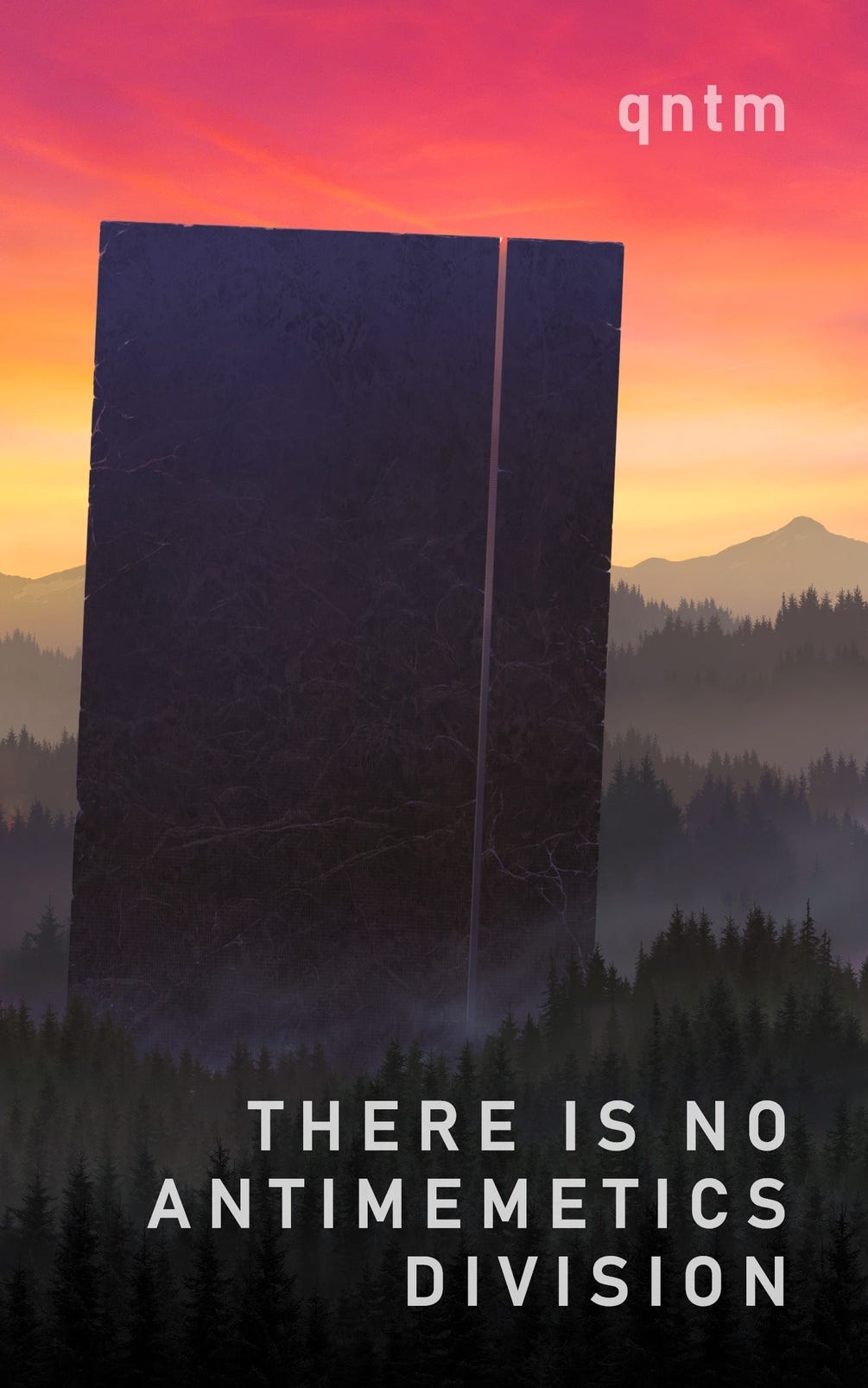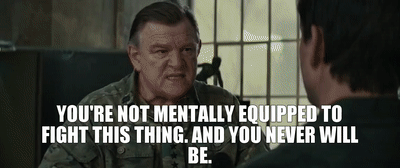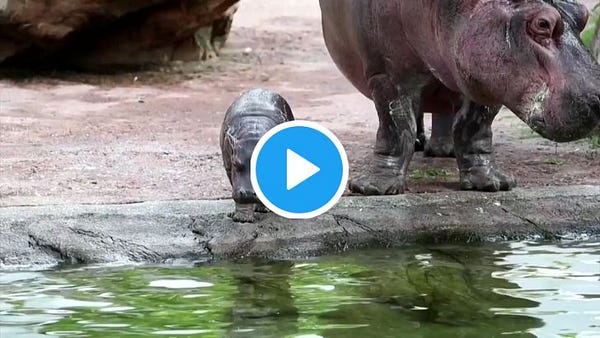So it turns out, #14: There is No Antimemetics Division
Hi,
So this is what I’ve been thinking about lately:
There Is No Antimemetics Division
I’ve been struck, recently, by the wrap-up of an amazing, long-running series of short stories in the shared fictional sandbox called the SCP Foundation, called “There is no Antimemetics Division.”
In real life, the SCP Foundation Wiki is a shared fictional universe for creepypasta, the modern Web equivalent of scary stories around the campfire — stories intended to creep you out, or mess with you, or just cause you to think about how screwed up the world is. (I mean this sincerely: if you’re someone who has bad dreams, don’t particularly read this website, especially not near bedtime.)
The overall conceit of the site is that it’s the shared incident records and stories of the SCP Foundation, a secret quasi-governmental group that attempts to Secure anomalous artifacts and monsters, Contain their impact on human society, and Protect…well, it’s ambiguous whether they’re protecting us from the anomalies, or the anomalies from us.
The universe is unambiguously dark; though “canon” is a vague and uncertain concept for a shared wiki of stories edited by hundreds of pseudonymous writers, it’s generally accepted that this is the universe where the human race does not win, where “The Ones Who Walk Away from Omelas” would be a unreasonably happy ending. In-universe, the Foundation has a rating scheme for potential apocalypses that routinely has to be re-normalized to accommodate even worse ways the human race could end.
The Antimemetics Division is unambiguously a story about fridge horror, the feeling that comes as the full, terrible implications of an idea slowly rolls over you after you’ve finished reading. It’s the story of the Foundation’s researchers, led by Marion Wheeler, who deal with antimemes, described as:
An antimeme is an idea with self-censoring properties; an idea which, by its intrinsic nature, discourages or prevents people from spreading it.
Antimemes are real. Think of any piece of information which you wouldn't share with anybody, like passwords, taboos and dirty secrets. Or any piece of information which would be difficult to share even if you tried: complex equations, very boring passages of text, large blocks of random numbers, and dreams…
But anomalous antimemes are another matter entirely. How do you contain something you can't record or remember? How do you fight a war against an enemy with effortless, perfect camouflage, when you can never even know that you're at war?
Welcome to the Antimemetics Division.
No, this is not your first day. (link)

The series, written by Sam Hughes (who goes by “qntm” on the internet, ironically a nearly-useless name after Kanye chose it for a brand a few months ago), is a story about the end of the world, and what happens after. It’s about a challenge to the very concept of a Foundation that defeats the weird. “The Foundation defeats anomalous threats by studying them and codifying strategies to defeat them?” Hughes might as well be asking. “Well, what if you faced a threat that was so alien to human thought that it erased every memory of itself, that was to us like a ‘wolf on the Galapagos,’ and that if you did comprehend it successfully would consider you its prey?”
Most people don’t fare well:

To even have a chance, to even survive for a while like Marion Wheeler has, you’d have to develop strategies that look nothing like how a normal organization. You’d have to find ways of identifying stubborn holes and gaps in your knowledge, and reasoning about what lies inside those epistemic black holes. You’d have to trust the notes of researchers whose names you don’t know, who may have been erased out of history, just to have evidence to work on. You’d have to rely on your own instincts and reason on the fly — after all, anything you can remember of your training is by definition not a threat to an antimemetic enemy. And even if you win, you may never really know why. You might not even remember that there was a war, or who was lost.
You might not even remember that you were fighting.
****
The Antimemetics Division is science fiction in the classical style — it starts from the assumption that there is such a thing as anomalous memes and antimemes, and goes from there. But it’s also the story of what happens when a canonically smart, hyper-competent bureaucracy faces an an Outside Context Problem. After all, bureaucracies — even fictional ones — rely on standards, and processes, and data sets.
They rely on, as Charlie Stross once put it, the ability to take inputs of any sort, and produce outputs that fit a set of criteria.
Maybe you’d just call that “the presumption of regularity.”
So what happens when the whole system’s rules, processes, procedures are built on an assumption that is radically, fundamentally broken?
****
The Antimemetics Division isn’t about fascism, or bureaucracy, or any of the careening apocalypses we face over the next 30 years from pandemics, mass privacy-violation, climate change, right-wing decentralized authoritarianism, or even more old-school threats like nuclear war or asteroids hitting us in the face.
But it is about what it means to be responsible for fighting a catastrophic problem perpetually outside of your comfort zone. It is about being capable of throwing away everything you believed about who is competent (“Is the WHO competent?”), what makes things safe, and how you know what to do. It’s about an era where the author himself writes things like:



But I don’t want you to get me wrong. The apocalypse is already baked in. The only question we have left is what to do about it, and whether we’re going to pull through. Or, as the author put it:



Okay, time for palette cleanser animal memes.






Next time on Dave Kasten:
████ █████████ █████
Disclosures:
Views are my own and do not represent those of current or former clients, employers, friends, or my cat.
I may on occasion use Amazon Affiliate or similar links when referencing things I’d tell you about anyways. As an Amazon Associate I earn from qualifying purchases; I donate the proceeds to charity. While Substack has a paid subscription option, I don’t have any plans to use it at this time and anyone who gets this newsletter now surely won’t be ever paying for their subscription.




